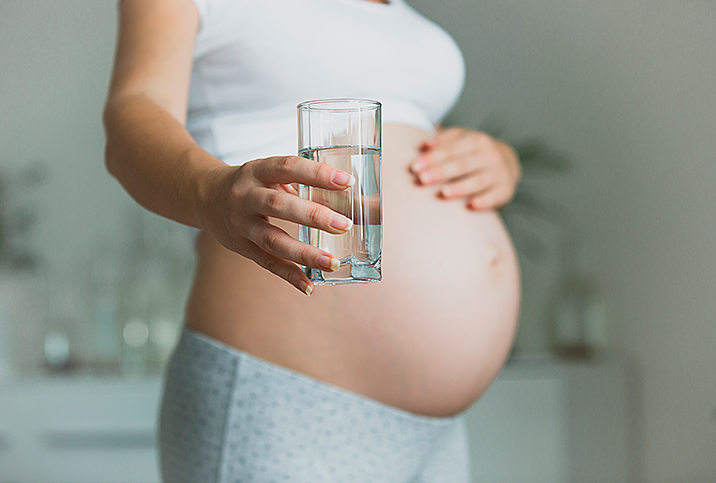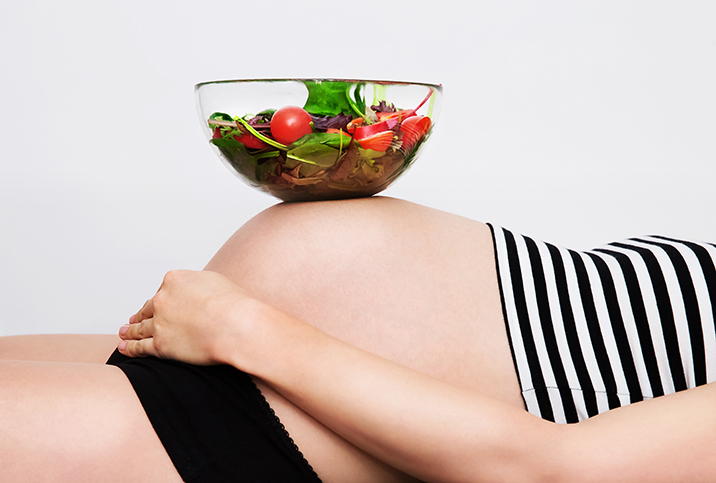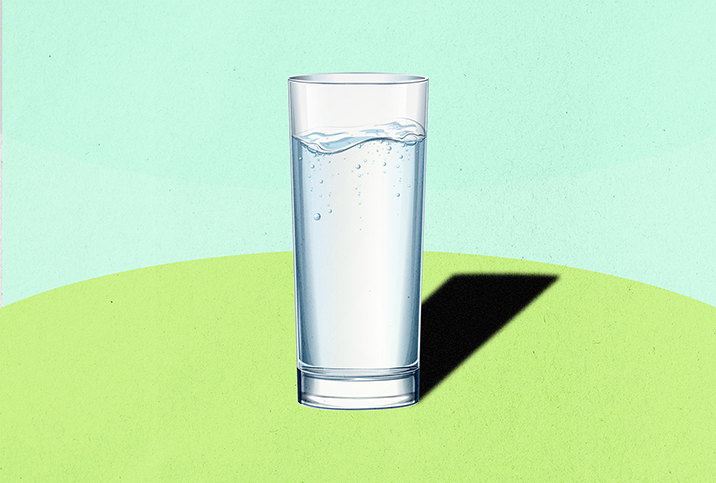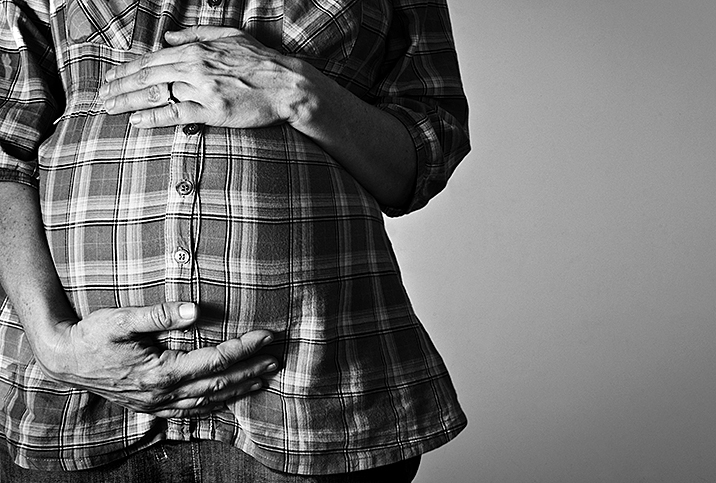How Much Water Should I Drink While Pregnant?

Hydration is important for everyone, but it's especially key for pregnant people. According to the American College of Obstetricians and Gynecologists (ACOG), proper hydration during pregnancy helps aid digestion, supports amniotic fluid production and promotes blood circulation, nutrient distribution and waste removal in the body.
But how much water is necessary during pregnancy? And is there such a thing as going overboard with the H2O? (Many a pregnant person's bladder might say yes.) Here's what you need to know about how much water you should drink while pregnant.
Pregnancy hydration
The truth is, there really doesn't seem to be any need to drink more water during pregnancy than at any other time in your life. ACOG recommends pregnant people aim to drink 8 to 12 cups (64 to 96 ounces) of water per day, which is about the same recommendation the Mayo Clinic gives for adult females (11.5 cups daily). Additionally, the Mayo Clinic notes about 20 percent of fluid intake will come from food, so you can keep that in mind as well—not all of your hydration needs to come from water alone.
Doctors typically recommend pregnant people aim to drink 50 ounces of water per day (6.25 cups), stated Daniel Roshan, M.D., a maternal-fetal medicine specialist with an expertise in high-risk pregnancies, and director and medical manager of Rosh Maternal & Fetal Medicine, affiliated with NYU Langone Medical Center.
Risks of getting dehydrated during pregnancy
According to Roshan, one of the risks of getting dehydrated during pregnancy is that when you're pregnant, you're going to feel the effects of dehydration much more quickly and intensely than a nonpregnant person would. Dizziness, nausea and overall malaise may all kick in, so it's especially important to drink lots of water on hot days or days when you're extremely active, he added.
There are serious risks associated with your baby getting dehydrated. Roshan said when the pregnant person gets dehydrated, it decreases fluid to the placenta, causing the baby to become dehydrated as well. Because amniotic fluid is actually produced by the baby (essentially, after the first trimester, it's urine from the baby), once the baby becomes dehydrated, the amount of amniotic fluid around the baby will decrease as well.
"It's important for the mother to drink enough to maintain their circulation, and that circulation and fluid of volume will maintain the circulation of the placenta and therefore the baby," Roshan explained.
The truth is, there really doesn't seem to be any need to drink more water during pregnancy than at any other time in your life.
Amniotic fluid protects the baby in the womb by providing a built-in "cushion" from outside trauma, helps prevent the umbilical cord from getting compressed, wards off potential infections and helps get vital nutrition—including proteins, electrolytes, immunoglobulins and vitamins—to the baby.
"Amniotic fluid is really essential for the development of the fetus," added Suzie Devine, R.N., MSN, founder and CEO of the women's health company Binto. "If we don't have enough water, that can cause dehydration, and then this can limit the amniotic fluid, which can hurt babies' growth."
The other serious risk of dehydration in a pregnant person is premature labor. Roshan noted that if a person gets really dehydrated, it can cause the uterus to contract because the antidiuretic hormone—which is linked to oxytocin, the same hormone that causes contractions—will increase.
"So when a person gets really dehydrated during pregnancy, it can cause you to start contracting," he said. "And some [people] do go into premature labor because of dehydration."
Signs of dehydration for pregnant people are generally the same as for nonpregnant people, with some additional symptoms due to the pregnancy, including:
- Feeling lightheaded
- Dizziness
- Dry skin
- Sunken eyes
- Dry or decreased saliva production
- Cramping
- Pain
- Contractions
- Premature labor
And last but not least, Devine stressed the importance of getting enough water to both prevent and help manage urinary tract infections (UTI)—pregnant people are at an increased risk of UTIs. Not only can a UTI be uncomfortable, but if left untreated, it can also lead to complications, such as premature labor.
Pregnancy problems: Morning sickness and a full bladder
Dehydration during pregnancy may be risky, but pregnancy itself can also make getting enough to drink a bit of a challenge.
Roshan noted that while "normal" morning sickness usually doesn't prevent a pregnant person from getting enough fluids to maintain hydration, anyone who suffers hyperemesis gravidarum (HG)—persistent nausea throughout all trimesters—will need to work closely with their doctor, because dehydration can happen very easily and require hospitalization and IV fluids.
It can also be challenging to constantly feel you need to pee, so some pregnant people may inadvertently restrict fluids to avoid what feels like taking 800 daily trips to the restroom. Both fortunately and unfortunately, the constant need to pee doesn't mean you're drinking too much—it just means you're pregnant.
"At the beginning of the pregnancy, the uterus falls on the top of the bladder as it comes out of the pelvis, and that pressure on the bladder creates the feeling of [needing to go] to the bathroom more frequently," Roshan said. "And then, toward the end of the pregnancy, when the baby's presenting, there's the head, which is more common, or the buttocks if it's a breech baby, which will put pressure on the bladder and that makes them go to the bathroom more frequently."
Roshan and Devine provided these tips for staying hydrated during pregnancy:
- If you can't keep water down, try ginger ale or sparkling water.
- Herbal tea with lemon can be both soothing and hydrating.
- Focus on drinking as much water as possible during the day and restricting fluids right before bed to minimize nighttime trips to the bathroom.
- Empty the bladder whenever it feels full to decrease the risk of a UTI.
- Try to keep up with your fluid intake before you get too thirsty.
Devine added that it can be helpful for pregnant people to drink fluids other than water, too. "I encourage women during pregnancy to focus on electrolytes," she said. "Water is great, but we want to make sure you're getting those key electrolytes, like sodium, magnesium, etc. So drinking some sports drinks that are going to be lower in sugar are really essential, and they may actually taste better for you early in pregnancy."
Can you drink too much water?
"It's very rare," said Devine. "I can't imagine anyone doing it, but there have been cases."
She noted that one sign of overhydration in pregnancy is headaches—admittedly, a very common thing that also happens just from being pregnant. However, she said, if you do have headaches and are drinking more than 96 ounces a day, you should talk to your physician about your fluid intake and ways to adjust accordingly for your body.
You should also be sure to talk to your pregnancy care provider about any other symptoms you are having, such as pain when urinating, contractions or regular cramping, dizziness or not being able to keep any food or fluids down.


















